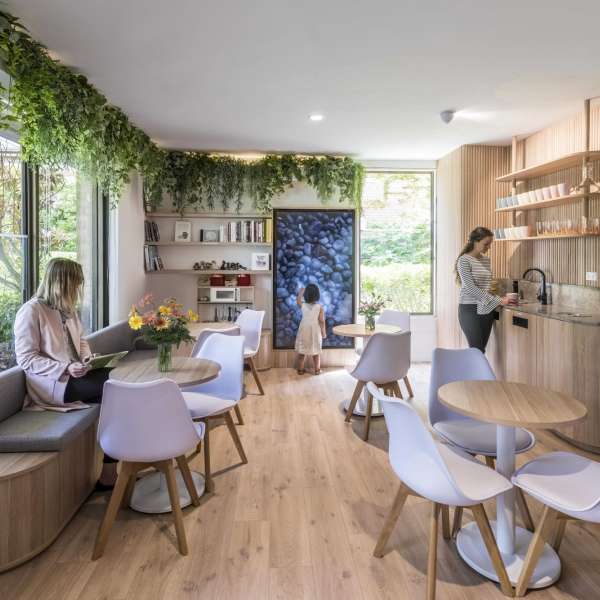
Introducing Integrative Korean Medicine
Integrating five components of Korean Medicine - Eight Constitution Medicine, Constitutional Acupuncture, Personalised Herbal Medicine, a diet and lifestyle Regimen, and deep abdominal (Danjeon) breathing.
It is a great pleasure to join Next Practice care of GenBiome. I'm Hyonna. My specialty is working with my patients using a personalised and holistic medical approach, called Korean Eight Constitution Medicine (ECM) & Constitutional Acupuncture. The effectiveness of ECM has been extensively investigated through peer-reviewed clinical research and empirical evidence based on tens of thousands of patients for more than fifty years.
Why Eight Constitution Medicine (ECM)?
People are different. We all have different abilities and preferences, and the same applies to your health and ‘constitution’ (or ‘body type’). For example, you may know someone who controls weight and thrives on a meat diet, but others who eat meat may suffer from atopic dermatitis, irritable bowel syndrome, and other chronic inflammatory disease. A High-Carb diet may work wonders for some, but leaves others feeling tired, gaining weight, and suffering from metabolic syndrome. Vigorous cardio pump exercise or running is good for some, swimming or yoga is better for others. So knowing your constitution - for example, what food and fitness activities suit you - is the foundation to leading a healthy life.
ECM recognises these differences and that not all disease is the same, presenting different trigger factors, inflammatory responses, and symptoms. ECM treats disease on this basis by restoring equilibrium based on a patients' constitutional characteristics.
Eight Constitution Medicine integrates well with Western Medicine to treat:
- chronic conditions that don't respond well to western medicine
- patients who prefer a natural drug-free therapy (eg. asthma, hay fever, glaucoma, arthritis, dermatitis, insomnia, neuralgia or neuropathic pain)
- chronic conditions that require western medicine but present unwanted side-effects that need to be ameliorated (eg. depression, bipolar disorder)
- weakness after post-operative events or invasive therapies (eg. cancer, digestive function issues, low immune function, general weakness)
- pain and health management among the elderly (eg. chronic pain, recurrent inflammation, low life force or vitality)
- chronic conditions among children (eg. asthma, dermatitis, enuresis, low immune function)
- health issues of middle-aged adults (eg. high blood pressure, weight gain, diabetes, impotence, hormonal imbalance, menopause symptoms)
Constitutional Acupuncture
It is a powerful method that can result in rapid improvement of complaints such as: neuralgia, asthma, glaucoma, irritable bowel syndrome, hay fever, arthritis, endometriosis, infertility, dermatitis, low immune function, chronic pain, migraines, insomnia, and digestive dysfunction. It can not only relieve major complaints, but it can also tend to resolve other complaints at the same time because of the treatment's holistic nature.
Personalised Herbal medicine
Herbal Medicine formulations are personalised based on the patient's Constitution and disease state.
Diet and lifestyle Regimen
My enduring focus is on prevention, so I provide a personalised regimen of diet and lifestyle advice to each patient after several treatments. This allows my patients to take control of their own health and prevent illness over the long term.
Deep abdominal (Danjeon) breathing
I teach Danjeon breathing to patients. Breathing involves active and passive processes. The muscles and tissues surrounding the respiratory tract and lungs support the work. The diaphragm is the most efficient muscle of breathing. Danjeon breathing (in Korean) means deep abdominal breathing. When we do this, your abdominal muscles help move the diaphragm moves and so give you more power to empty your lungs and take deep breath. When we do Danjeon breathing, more oxygen goes to all parts of our body, so it stimulates metabolism and makes more oxygen available to the cells. The organs, autonomic nervous function, and musculoskeletal system can certainly get benefit by lowering your heart rate, regulating blood pressure, and decreasing release of stress hormone. Dan Jeon breathing pulls down energy from the chest and head and relaxes the mind.
This is the first article for the GenBiome community, providing a general introduction to Integrative Korean Medicine approach and Eight Constitution Medicine (ECM). I look forward to sharing more information on each Constitution and how ECM can help with your specific health through a series of articles.
Selected research articles
Hwang, M. H. et al. (2016), 'Clinical Case Study of a Patient with Complex Regional Pain Syndrome (CRPS) Type Treated by 8 Constitution Acupuncture', THE ACUPUNCTURE, 33(3), pp. 181-187.
Kang, H. et al. (2021) 'Exploring Heart Rate Variability as a Biomedical Diagnostic Tool for the Disympathetic Dimension of Eight-Constitution Medicine', Evidence-Based Complementary and Alternative Medicine. Edited by C. Worsnop. Hindawi, 2021, p. 6613798. doi: 10.1155/2021/6613798.
Kim, H.K. and Hong, S.U. (2009) '3 Cases of the effect of 8 Constitution Acupuncture on Allergic Rhinitis', The Journal of Korean Medicine Ophthalmology and Otolaryngology and Dermatology, 22(2), pp. 251-260.
Kim, R.Y., Lee, D.S. and Lee, S.H. (2001) 'A clinical report on 8 constitutional acupuncture therapies for treatment one case of persistent and idiopathic hiccups', The Journal of Korean Oriental Internal Medicine, 22.
Kuon, D. (1965) 'A Study of Constitution Acupuncture', Journal of the International Congress of Acupuncture & Moxibustion, Tokyo Japan Vol. 10, pp.149-167
Kuon, D. (1999) 'Eight-Constitution Medicine: An overview.', IMKS Occasional Papers No.2. Institute for Modern Korean Studies. Yonsei University Press, 12, pp. 601–623.
Kuon, D. (2010) 'A Theoretical Basis for The Eight Constitution Acupuncture', Nova Science Advances in Medicine and Biology, 5.
Lee, H. H. (2002) 'A clinical report on 8 constitutional acupuncture therapies for treatment one case of dizziness suggested Menieres syndrome', Journal of Physiology & Pathology in Korean Medicine, 16.
Lee, M. S. et al. (2009) 'Randomized clinical trials of constitutional acupuncture: a systematic review', EvidenceBased Complementary and Alternative Medicine, 6(S1), pp. 59-64.
Lee, Y. K. and Kwon, O. G. (2012) 'A Case Report about the Patient with Trigeminal Neuralgia Treated by 8 Constitution Acupuncture', The Journal of EastWest Medicine, 37(3), pp. 65-70.
Paik, M. J. et al. (2009) 'Altered urinary polyamine patterns of cancer patients under acupuncture therapy', Amino acids, 37(2), p. 407.
Seo, Y.W. and Ko, H. (2006) 'Eight Constitution Acupuncture Effect on Thrombocytopenia After Splenectomy at Idiopathic Thrombocytopenic Purpura as First Manifestation of Systemic Lupus Erythematosus Lupus', THE ACUPUNCTURE, 23.
